Arts & Culture

The later it gets, the more nothing.
—Woman at the register
Yeah, we’re open ’til midnight,
but few customers come after 9:00.
I like when it’s slow and quiet—
just me and the store lights.
I don’t like the sirens
racing along Main Street.
I always worry it’s my kid hurt
or my best girlfriend with another
black eye or busted rib.
When I’m here by myself, I draw
dress patterns for my daughter.

TO UNDERSTAND MY evolution as a reconciliation leader, you must first understand that I began my journey sincerely believing that if I could convince evangelical Christians that reconciliation was not some politically motivated agenda but a biblical calling rooted in Scripture, they would pursue racial justice. For years I tried to be biblical enough, nonthreatening enough, patient enough, persuasive enough, theologically rigorous enough, so that no one could say I had a hidden agenda.
That’s what my ministry was about for a very long time. I preached the good news of multiculturalism and diversity at churches and conferences. I led workshops and taught seminars and told people about inclusion and equity and how Jesus demonstrated these principles in his ministry.
But along the way, there were indicators that my approach, while good and well-intentioned, was not effecting the type of change I knew in my heart needed to take place.

IN MARCH , I made my first, and hopefully last, “panic-buy” of the pandemic: three survivalist books that look more like they belong in a nuclear bunker than on my bookshelves amid the theology, poetry, and knitting patterns. My purchases were, however, inspired by my reading Parable of the Sower and Parable of the Talents, classics by the science fiction literary giant Octavia E. Butler (1947-2006).
In these novels, Lauren Olamina—a young, disabled black girl—survives the apocalypse and helps rebuild society with her knowledge of edible wild plants, her sheer will and bravery, and her newfound religion, Earthseed. Lauren’s ability to adapt, to change, is her route through unimaginable suffering and the bedrock of her faith.
Originally published in 1993 and 1998, respectively, Butler’s Parable books were reissued last year, highlighting their current resonance. Sower introduces us to the United States in 2024, a dystopia ravaged by global warming, capitalism, and violence. Slavery, misogyny—the witch-burning kind—homelessness, and addiction are rampant. Lauren’s community is secure as long as the walls that surround it stand; as she rightly senses, walls are wont to crumble. She launches a backup plan that offers a hard hope within relentless loss. Talents continues Lauren’s, and her daughter Asha’s, journeys over the coming decades as the U.S. faces rising terrorist Christian nationalism and the election of an ultraconservative president who wants to “make America great again.”
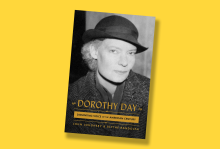
JOHN LOUGHERY AND Blythe Randolph have written a compelling and complete biography of a complex woman who may be the next American saint—and written it with a vibrant, personal voice. They place Catholic Worker co-founder Dorothy Day’s life in historical context, something the small circle of the Catholic Left I inhabit sometimes doesn’t see, which makes this book different than others about her. It inserts her life squarely into the times in which she lived and shows how her fidelity to the gospel as a journalist, activist, and Christian anarchist put her at odds with both church and state. It also shows how she persisted, becoming more and more herself as she aged.
Loughery and Randolph describe Day’s childhood in Brooklyn, N.Y., Oakland, Calif., and finally Chicago; her recognition of an affinity with socialism and pacifism while at the University of Illinois; the men and women she worked and drank with during her young days in Greenwich Village; and her first arrest—as a suffragist.

FOR OVER A month now, like everyone else, I have been isolated at home. Here with me are my wife, Polly, and our two youngest sons, both college students. All of us are continuing our work and studies online, and our rural home has become a sort of cyber-monastery. We meet in the morning for daily Mass on YouTube, then peel off to our separate hotspots to toil through the day. We don’t have compline, but we do often reconvene to watch The West Wing.
This isn’t the life any of us would have chosen, but it’s probably good for the soul to surrender some of our precious, almighty power of choice, and it helps that almost everyone is going through this with us. But there’s one aspect of our locked-down life that we can’t attribute to the vagaries of a random virus, and it isn’t shared with most of our fellow citizens. Instead, it’s one of the many rank inequalities the COVID-19 crisis has exposed in American life.
Unlike most of you, we don’t have access to high-speed broadband internet. Two months ago, that might have seemed like a trivial complaint, but not now. And we’re far from alone. The best estimate says that there are about 42 million of us, about 13 percent of the U.S. population, mostly in rural America. Then there are all the people who could have access to broadband, but don’t, mostly because they can’t afford it. All told, about 30 percent of us are out here in the digital cold.
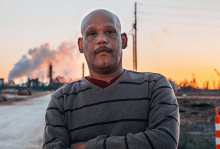
“Population: One”
When petrochemical plants overtook a historically black community in Louisiana, its residents were forced to leave one by one. But Stacey Ryan refused to go. Mossville: When Great Trees Fall is a documentary about Ryan’s commitment and resistance to environmental racism. Passion River Films.

THOSE ON THE margins live by a different economy. In the film Portrait of a Lady on Fire, the main characters live on the margins of a patriarchal society, and how they relate to one another shows creative care.
In the film, set in 18th-century France, a painter and her subject— a woman scheduled to marry a nobleman in Milan—fall in love. The painter Marianne is hired under the guise of being a walking companion to Héloïse, who, as a symbol of rejection of her forthcoming marriage, refused to sit for a previous portraitist.
After Marianne shows Héloïse a portrait of her she’s completed in secret, Héloïse criticizes it and agrees to sit for Marianne. During these few days of painting, Héloïse’s mother leaves, and the house and its economy rearranges.
Earlier in the film, the three women left in the house had strict roles and responsibilities. Héloïse went for walks, Marianne painted, and the maid Sophie served food. However, as love develops between Héloïse and Marianne, the household leaves behind the strict norms of aristocracy and assumes a much more egalitarian space. In a striking scene filled with role reversal, the lady Héloïse cooks, the artist Marianne pours wine, and the maid Sophie cross-stitches. On the margins of patriarchy, the strict delineations of class are thrown away, and the three share responsibility and care for one another.

THIS ISN'T A lion: It’s a miracle. You can almost hear the imperious growls that would have thundered in the imaginations of pedestrians approaching ancient Babylon’s Ishtar Gate. They would have walked along the Processional Way to enter the inner city, flanked by cerulean blue tile walls with 120 nearly life-sized lion bas-reliefs—a spectacle!
Not so in 1899, when German archaeologists arrived on the banks of the Euphrates—80 miles from Baghdad—and dug until 1917. Babylon’s splendor had been reduced to mounds of thousands of glazed brick fragments, which would fill nearly 800 crates sent to Berlin. There, each piece was laboriously cleaned, stabilized with modern material, sorted and assembled into whole bricks, and ultimately restored into panels of proudly parading beasts in Berlin’s Pergamon Museum. Iraq has been trying to get them back since the 1990s.
For nearly two centuries the Greeks and the British have been arm wrestling over the Parthenon Marbles—including a lengthy frieze of a mythical Greek feast, a muscled river god, and voluptuous female figures—taken from the Acropolis in Athens and now displayed in London’s British Museum. Lord Elgin was Britain’s ambassador to the Ottoman Empire, which encompassed Greece. Greece claims that Lord Elgin stole them, that the sale was illegitimate since Greece was occupied, and that they should be returned.

One of the biggest gleanings from Mrs. America is that women and their motivations for power are complicated and far from monolithic.

Burton and Dreher share similar aesthetic views about Christianity and the past.

Speculative futurism isn’t mentally escaping into a future that is either far more dystopic than our present or far more utopic than we should expect — nihilistically leaning into our sense of dread and doom, or engaging an escapist fantasy that all will be better someday and calling this ungrounded vision “hope” can both be momentarily comforting. A speculative futurist ecclesiology looks at every fault line exposed by this pandemic alongside every gift and grace it illuminates.

Julia Alvarez is a Dominican American novelist, poet, and recipient of a National Medal of Arts award. Her latest novel, Afterlife, came out in April, and her latest children’s book, Already a Butterfly: A Meditation Story, will be released in June. “A Glimpse of the Garden,” an essay by Alvarez on centering prayer, appears in the June issue of Sojourners magazine. Alvarez spoke with editorial assistant, Hannah Conklin, about her newly released books, the connection between her work and spiritual practices, and finding hope during the COVID-19 pandemic.

CONFESSION: I HAVE a bone to pick with the word “curated” this month. I’m finding that the word, while generally useful in art contexts, let me down during Lent this year.
Let me explain.
“Curation” evolved from the word “curare” (to take care of) but, as it exists now, covers anything from making playlists to putting on a painting exhibition. I don’t have an issue with the chameleonic nature of the term, though I know it’s beginning to vex actual museum curators. What is difficult for me to wrap my mind around is the fussiness that curation implies.
It’s synonymous with caring for objects and, subsequently, caring for an audience by displaying the objects in an interesting and informative way. But, as a representation of spiritual wilderness, Lent seems diametrically opposed to the idea of a carefully considered experience. In Lent, nothing is planned. This year, I simply showed up in the metaphorical desert and started walking.
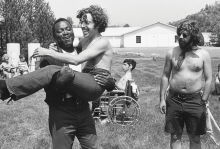
Lanyards and Legislation
Camp Jened, a former summer program for teens with disabilities, is the focus of the new documentary Crip Camp: A Disability Revolution. Co-directed by an attendee of the camp, with an overview of the relationships and activism that began there, Crip Camp is immensely prophetic and empowering. Netflix.

THE HYMN “I Sing a Song of the Saints of God” is one of my favorites in the Episcopal tradition, usually sung on All Saints Day. It concludes with the line, “For the saints of God are just folk like me / And I mean to be one, too.” It’s a reminder of the people in our lives—living and otherwise—who are everyday saints, not canonized but important in our formation.
In Dick Johnson Is Dead, filmmaker Kirsten Johnson celebrates her father, one such everyday saint. Dick isn’t actually dead, but he has been diagnosed with Alzheimer’s. How much of his life remains isn’t certain, but Johnson is determined to show him just how well he’s loved by trying to rid him of some of his fear of death.
Johnson does this in a darkly funny way that’s true to her dad’s mischievous streak: She collaborates with him on a series of staged scenes depicting his death from a variety of accidents. Dick is crushed by an air conditioner, falls down stairs, is hit by a construction worker’s nail-filled board, and more. “Everyone dies,” Johnson reminds us, even the people we love the most.
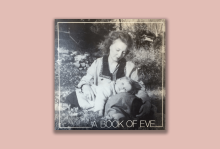
LIKE MOST POETS, she is largely unknown, but 97-year-old Catherine de Vinck can live with that. She has a dozen published volumes to her credit, a collection titled The Confluence of Time that she is working to publish, and the love of Christians drawn to the sometimes-shaky Jacob’s ladder of contemplation and social action. Thomas Merton was among her readers.
“Nothing stands still long enough / for us to find the first imprint / to grasp the pure moment of origin. / How then can we see the world as it is,” she writes in her poem “Ever-Changeless/Even-Changing.”
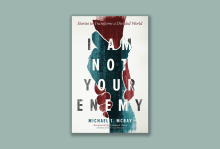
THERE'S A THEORY in peacebuilding that it can take as long to heal from a conflict as the conflict itself lasted. Depending on whom you ask, the conflict in Northern Ireland lasted 800 years, 400 years, or 30 years. The Good Friday Agreement officially ended the violence in 1998. Any way you spin it, this place isn’t very far along the healing journey.
The violence here lasted so long that it became almost normal. In my last taxi ride during grad school, the driver picked me up on the Antrim Road. “Do you like living here?” I asked. “I liked it better in the good old days—20 to 30 years ago,” he said. “It weren’t that violent. It were a pretty stable time, other than the bombs and guns and murders.”
I asked him if he’d been affected much by the violence. “No, not too much,” he said. “I mean, there was the time I saw my brother walking down the Falls Road, and a black taxi pulled up, rolled down its window, and blew his head off. I remember seeing my mother trying to put his brains back in.”

IN HER LATEST book, writer D.L. Mayfield welcomes readers on a journey of seeing. This essay collection weaves an exploration of the desires embedded in the American Dream with stories of Mayfield’s own social justice conversion and portraits of her Portland neighborhood.
These narratives of how colonialism, capitalism, racism, and consumerism store themselves in privileged American hearts invite self-reflection. Mayfield challenges the American Dream’s toxic individualism, dividing the book into four themes: affluence, autonomy, safety, and power. “We do not care that people will suffer and die,” she writes, “due to our own desire for safety.”
Mayfield reflects on her own awakening and exposure to xenophobic faith communities, where she began to have “serious problems reconciling the Suffering Servant with a conservative religious agenda.” The text also walks her readers through the gentrification of her neighborhood and how her community is affected by travel bans, the U.S. education system, and other aspects of local and national politics.

(“Oh I’ll leap up. Who pulls me down?”—
“Doctor Faustus,” by Christopher Marlowe)
Now can I join this dance?
See, I am thinner than vacuum.
I can kneel toward the sun
at the very angle of prayer
and feel the counterpoint
pulse through my veins.

Some mornings I drive to the duck pond
instead of writing poems. I can’t remember
how to keep words coupled to the truth.
So much lying has torn words loose
from what they stood for. Remember,
back when we agreed on their meanings?
I’d say honey for instance, and you could
taste it. Once you said freedom
and I saw doves rising from your shoulders.
We shared language so we were not alone.
We both loved words as if we could see them:
like ducks bobbing on a pond, dipping,
scooping, swabbing insects from the air.